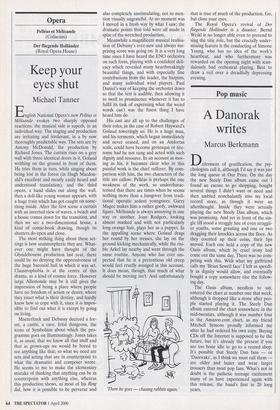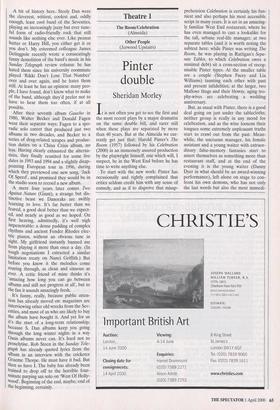Pop music
A Danorak writes
Marcus Berkmann
Deferment of gratification, the psy- chologists call it, although I'd say it was just the long queue at Our Price. On the day the new Steely Dan album came out I found an excuse to go shopping, bought several things I didn't want or need and then ambled nonchalantly into my local record store, as though it were an afterthought. Inside they were actually playing the new Steely Dan album, which was promising. And yet in front of the sin- gle till stood a straggly line of even straggli- er youths, some grunting and one or two dragging their knuckles across the floor. As they counted up their coins, their lips moved. Each one held a copy of the new Oasis album, which by cruel irony had come out the same day. There was no com- peting with this. With what my girlfriend calls my 'Brian Sewell face' I left as speedi- ly as dignity would allow, and eventually bought a copy somewhere else the follow- ing day.
The Oasis album, needless to say, entered the chart at number one that week, although it dropped like a stone after peo- ple started playing it. The Steely Dan album entered the chart somewhere in the mid-twenties, although it was number four in the Amazon.com chart, as my friend Mitchell Symons proudly informed me after he had ordered his own copy. Buying CDs off the Internet is supposed to be the future, but it's already the present if you are too bone idle to go to a record shop. It's possible that Steely Dan fans — or `Danoraks', as I think we must call them are older and lazier and wear larger trousers than most pop fans. What's not in doubt is the pathetic teenage excitement many of us have experienced again with this release, the band's first in 20 long years. A bit of history here. Steely Dan were the cleverest, wittiest, coolest and, oddly enough, least cool band of the Seventies, playing an increasingly jazzy but ever tune- ful form of radio-friendly rock that still sounds like nothing else ever. Like peanut butter or Harry Hill, you either get it or you don't. My esteemed colleague James Delingpole recently wrote a coruscatingly funny demolition of the band's music in his Sunday Telegraph review column: he has hated them since his university roommate Played 'R&M Don't Lose That Number' over and over again, and he hates them still. At least he has an opinion: many peo- ple, I have found, don't know what to make of the band, although they'd prefer not to have to hear them too often, if at all possible.
After their seventh album Gaucho in 1980, Walter Becker and Donald Fagen went their separate ways: Fagen to a spo- radic solo career that produced just two albums in two decades, and Becker to a series of drug-related scrapes and produc- tion duties on a China Crisis album, no less. Having clearly exhausted the alterna- tives, they finally reunited for some live dates in 1993 and 1994 and a slightly disap- pointing European tour in 1996, during which they previewed one new song, 'Jack Of Speed', and promised they would be in the studio soon to record a new album.
A mere four years later comes Two Against Nature (Giant), a strange but dis- tinctive beast we Danoraks are swiftly learning to love. It's far better than we feared, a good deal better than we expect- ed, and nearly as good as we hoped. On first hearing, admittedly, it's well nigh impenetrable: a dense pudding of complex rhythms and ancient Fender Rhodes elec- tric pianos, without an obvious tune in sight. My girlfriend instantly banned me from playing it more than once a day. (In tough negotiations I extracted a similar limitation treaty on Nanci Griffith.) But before you know it the melodies come roaring through, as clean and sinuous as ever. A critic friend of mine thinks it's `amazing how long you can go between albums and still not progress at all', but to the fan it sounds amazingly fresh.
It's funny, really, because public atten- tion has already moved on: magazines are interviewing other old wrecks from the Sev- enties, and most of us who are likely to buy the album have bought it. And yet for us it's the start of a long-term relationship, because S. Dan albums keep you going through the long winter nights in a way Oasis albums never can. It's hard not to proselytise. Rob Steen in the Sunday Tele- graph has already quoted lyrics from the album in an interview with the cricketer Graeme Thorpe. He must have it bad. But then so have I. The baby has already been trained to drop off to the horrible four- minute parping sax solo on 'West Of Holly- wood'. Beginning of the end, maybe; end of the beginning, certainly.























































































 Previous page
Previous page